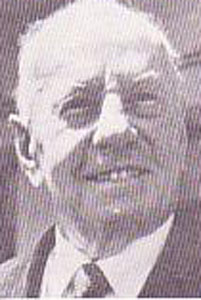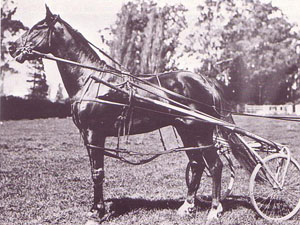| PEOPLE |
YEAR: 1981
 |
A trotting enthusiast who saw 66 NZ Cups, undoubtedly more than anyone else, died in Christchurch a few days ago. Dan Glanville, a long time member of the NZ Metropolitan Trotting Club committee, was 94 when he died.
Born in South Canterbury, he later had a chemist shop in High Street, opposite one of J R McKenzie's chain stores, a situation which led to both men becoming life-long friends and racing partners. A top provincial tennis player in his day, Dan Glanville was in Akaroa for a tournament when he was persuaded by local breeder Etienne Le Lievre to part with £400 for a colt by Nelson Bingen out of Bertha Belle. While having some misgivings at the time, he later had little cause to regret his purchase. The horse was Great Bingen who would eventually retire having won more than £14,000, a record that stood for many years.
Initially he had the horse registered in J R McKenzie's name to avoid his mother finding out he had a horse. She apparently was dead against any form of gambling. Later he sold a half-share in the future champion to Mr McKenzie. After Great Bingen had won his first race, Dan Glanville told his mother about it and she later became one of the horse's more avid fans.
The winner of at least half a dozen free-for-alls, Great Bingen was a decidedly unlucky horse when it came to the NZ Cup. He was second to Ahuriri in 1925, fourth after being badly interfered with in 1927 and the next year was beaten into second by his brother Peter Bingen in that now famous controversial whisker-close finish. By running 4:19.4 from 108 yards behind at Epsom, he became the first horse outside America to better 4:20 for two miles. At the end of his racing career he stood at stud and, while not wildly successful, he did sire two NZ Derby winners.
Mr Glanville joined the Metropolitan Club in 1926, and became a steward in 1934. He was a member of the committee from 1935 till 1963 when he was elected a life member of the Club. He served for a long time on the club's programme committee and was its chairman for many years. He is survived by his wife.
Credit: Graham Ingram writing in NZ Trotting Calendar 6Oct81
YEAR: 1945
 |
Dan Glanville went to Akaroa to play tennis and came home the owner of Great Bingen. He had never owned a horse in his life before. In fact, he was not at all keen to embark on a racing career; but J N Clarke and the late E X Le Lievre, between them, made up his mind for him, and parted him from £400 in cash for what the late Etienne Le Lievre was justified in describing as "the best-bred colt in NZ." Mr Glanville later sold a half share in the colt to Mr J R McKenzie.
Great Bingen was not named then. No one could so much as suspect his race-track eminence, because he had not even been tried when Mr Glanville bought him. But he was a grand-looking 18-months-old colt, built to order for the most exacting connoisseur of blood stock, and he had character written all over him. That character, inherent in Great Bingen from the day he was nothing but a twinkle in his mother's eye, manifested itself throughout a dazzling career, a career that will always live as one of the most stirring in light-harness history.
He was a personality horse - plus. We have not had many personality horses. Of all the great ones I have seen I would put only Great Bingen and Harold Logan in that category. Great Bingen's personality began to find expression from the very day he left Akaroa on his long trek over the hills to Little River. There were no horse-floats in those days, not in Akaroa, anyhow, and Mr Le Lievre, then an active man of about 67 years of age (he lived till he was nearly 90) rode a hack and led Great Bingen on the steep arduous walk. Everything was going as merrily as a wedding bell when suddenly, right in the middle of the township of Little River, Mr Le Lievre's hack fell from under him, and Mr Le Lievre broke a leg. Great Bingen was free, but did he panic? Not he. He merely cropped the grass on the side of the road and finished up licking Mr Le Lievre's face as he lay on the ground. Help was not long in arriving, and, to cut a long story short, this unsung, unnamed, untried colt, later to bring thousands to their feet as a race-course idol, was safely entrained for Christchurch.
Of all the sidelights of Great Bingen's career, his unrehearsed swim in the Swan River, West Australia, followed by an unbridled gallop through the heart of Perth, is perhaps the best. It is certainly the funniest, the way Mr Glanville related it to me.
Great Bingen, as a 6-year-old, was taken to Perth for a series of championship races. He was accompanied by Mr Glanville, Mr McKenzie and James Bryce, who was his trainer and driver on the trip. Great Bingen won his first two races of the series very easily, but then followed a poor showing, and stories of doping fairly screamed from the Perth papers. "Somebody has got at him," was the general cry. The horse was certainly listless. He had lost his fire. So Bryce decided that a swim in the Swan River was what the doctor would order. In they went, Bryce rowing the boat, and an attendant holding Great Bingen on a tow-rope. Soon they were out to swimming depth. After a few preliminary plunges and snorts, Great Bingen settled down to a regular Olympic stroke. So well did he master the water at this, his first acquaintance with aquatics, that he was soon outstripping the boat, Bryce and all in it.
Mr Glanville and Mr McKenzie looked on with mixed feelings from the bank. Soon these feelings developed into misgivings as Great Bingen put his head over the side of the boat and nearly upset it. "There are sharks in these waters," murmured one of them. All of a sudden the attendant with Great Bingen on the lead was forced to let go his hold. Things had reached a climax. Bryce was thinking about the sharks, Mr McKenzie and Mr Glanville were thinking about the horse, the horse was probably thinking about his dinner and enjoying his newly-won freedom.
The Swan river is nearly a mile wide where this little drama was being enacted, and for one horrible moment the men on the bank thought their noble steed was about to strike out for the opposite bank. He was swimming like a born Weismuller, and was nearly in the middle of the stream when, quite suddenly, he turned round and headed homewards. Thank heaven!
By now Bryce and his boat had returned to terra firma. All that remained to be done was for the horse to be caught when he made dry land. That's what they thought! But they reckoned without one thing - the horse's co-operation. And you can imagine their dismay when the chief actor in this mounting drama, now landed safely, shook himself disdainfully and took of for goodness knows where. The last his owners ever expected to see of their pride and joy was a wild, galloping Great Bingen, hurdling a hefty obstacle in his stride and disappearing into the heart of the city of Perth.
When this breath-taking turn of events had subsided, the three gentlemen left on the banks of the river Swan proceeded to take stock of one another. "Who's idea was it anyway?" "Mon, who'd have dreamt yon horse would ha done a thing like that." "What did you let him go for?" "Dinna ye ken aboot the sharks?" "He's done for now, anyhow." And a lot more in the same vein - but stronger. Disconsolately, the three pig-islanders groped their way back home, back to the stables which had only recently sheltered their champion. What sort of muts would the Aussies think they were? Mortification, tribulation and humiliation entered the stable-yards hand in hand. "Wonder if he ended up in a ditch or ran head on into a tramcar?" one of his owners asked himself.
But by some miracle, or tremendous good luck, Great Bingen had done neither. He had 'seen Perth first,' or a large part of it, anyway, and with the instinct of a homing pigeon, had come back to his boots and manger. Yes, there he was, with a casual whinny for his dishevelled countrymen as they sidled into his stall.
The escapade could have done him little harm, because he won his next two races at the championships, both over two miles, and finished a close second to Taraire in the final. Great Bingen had many drivers in his lengthy career. All of them will testify to his indomitable courage, his almost uncanny intelligence in difficult situations or tight corners, his robust health and physique.
The late W J Tomkinson never had anything to do with Great Bingen, except to see him, more often than not, streaking past him in races. But Tomkinson had a very high regard for him. He used to say: "He's no better than he looks!" That was a round about way of paying the brown stallion a high compliment, because, in racing condition, he looked fit to race for a Kingdom.
Great Bingen won £13,320 in stakes in the Dominion, which still stands as a record. To this has to be added £800 which he won in Australia. Great Bingen was a famous free-for-all pacer, winning six events of this kind. He was the first pacer in NZ or Australia to better 4.20 for two miles, and he won against good horses from long marks, such as his victory in the York Handicap from 108 yards.
Credit: 'Ribbonwood' writing in NZ Trotting Calendar 30May45